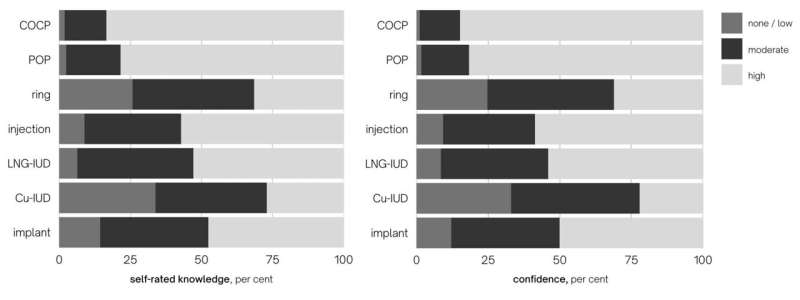Pharmacists providing contraception info and advice report barriers to quality care in Australia

New research has found community pharmacists provide contraceptive information but described lacking the necessary resources and support to be able to provide quality contraceptive counseling.
"Improving access to quality contraceptive counseling in community pharmacy: Examining the knowledge, attitudes and practices of community pharmacists in Australia" is published in BMJ Sexual & Reproductive Health.
First author Pip Buckingham is a Ph.D. candidate in the NHMRC SPHERE Centre of Research Excellence in Women's Sexual and Reproductive Health in Primary Care in the Department of General Practice, School of Public Health and Preventive Medicine at Monash University.
Buckingham says that "In a survey of 366 community pharmacists working in community pharmacies across Australia, we sought to understand pharmacists' knowledge, attitudes and practices in relation to contraceptive counseling (tailored, in-depth discussions with patients about the range of contraceptive methods, to support them to make informed decisions about contraceptive use)."
"Contraceptive counseling should involve accurate information about all available methods and ensure that medicine safety and the person's own preferences are factored into medical decision-making. If poorly done, the person may be unprepared for side-effects, unsure of how to use their contraceptive correctly, or miss opportunities to learn about methods most suited to their needs."
"Most of the pharmacists surveyed stated they currently discuss contraception with their patients. They felt their role in increasing access to information and decision support for contraception use was important."
"However, pharmacists felt a lack of remuneration, relevant training opportunities and professional resources were key barriers to providing contraceptive counseling in the pharmacy setting. Further, only 45 percent of pharmacies had a consultation room to improve privacy. These barriers need to be addressed for pharmacists to be able to provide quality, patient-centered care."
"Pharmacists working in areas with GP shortages were the most likely to report having advanced accreditation and a private consultation room in their pharmacy. These pharmacists could make info and advice about contraception more accessible for people living in these currently under-served communities."
More information: Pip Louise Maria Buckingham et al, Improving access to quality contraceptive counselling in community pharmacy: examining the knowledge, attitudes and practices of community pharmacists in Australia, BMJ Sexual & Reproductive Health (2022). DOI: 10.1136/bmjsrh-2022-201623





















